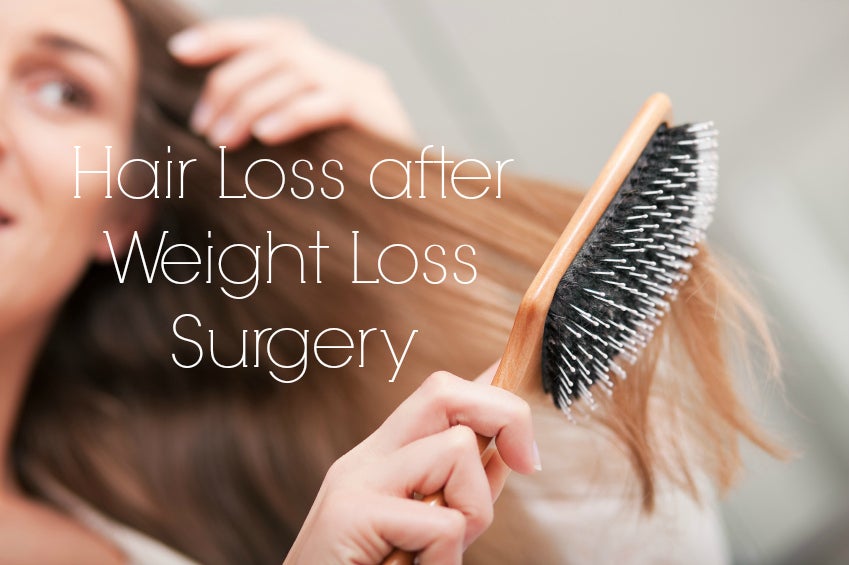
Unfortunately, hair loss is a natural process after surgery. Hair loss happens due to the stress of surgery, the rapid weight loss after surgery and the challenge of getting adequate nutrition after surgery. Hair goes through a growth cycle and a dormant cycle. Hair thinning is generally noticed two to four months after surgery and regrows about nine to twelve months after surgery. During times of stress, your body will shuttle protein towards essential functions like a beating heart, breathing, digestion, a healthy immune system and muscle movement. Contrary to popular opinion, hair growth is not an essential function during times of stress. Optimizing nutrition before and after surgery can help minimize hair thinning.
Understand the Life Cycle of a Strand of Hair
Anagen: This is the growth cycle of hair. Hair can grow for two to eight years.
Catagen: The time when the strand of hair transitions to the resting or dormant stage. The hair follicle will shrink and then shed the hair. This stage can take two to three weeks.
Telogen: This is the resting or dormant phase of a strand of hair. Normally this takes two to three months. Under stressful conditions, like surgery and rapid weight loss, the dormant cycle last several more months.
Generally, 90 percent of the hair on your scalp is in a growing phase. About 10 percent of your hair is either in the shedding or dormant stage.
Optimizing Nutrition
The goal for pre-surgery nutrition education is two-fold. First, we want to help you optimize your nutrition status before surgery. Secondly, we introduce the concepts of post-surgery nutrition.
Here are some tips on optimizing your nutrition:
- Low protein status is a common reason for hair thinning. Are you getting enough?
- Take a bariatric multivitamin. Work with your dietitian to figure out one that works best for you.
- Research shows that adding an Omega 3 supplement along with collagen peptides may be beneficial for hair health.
- Get your lab work done as recommended. This will help target key nutrients to improve before and after your surgery.
- Have post-surgery follow-up appointments with the dietitian every three months after surgery. Getting adequate nutrition after surgery is a challenge. The dietitians will brainstorm with you to find ways to improve your nutrition status.
If you are concerned about significant hair loss, contact your health care provider. Further investigation may be needed.
The following is a list of other potential causes of hair loss:
- Stress or trauma events: Includes surgery, injury, burns, chronic or major illness, severe infection, childbirth, rapid weight loss, high fever, physical or emotional shock, and chronic or acute stress events.
- Genetics: Sometimes, male or female pattern baldness is genetically unavoidable. Hair thinning in general may be genetically driven.
- Medications: Examples include some chemotherapy drugs, blood thinners, beta-adrenergic blockers used to control blood pressure, heart medicines, retinoids (contains vitamin A), arthritis medications, anti-depressants and oral contraceptives. Check with your doctor to see if you are on a medication that might a part of your hair thinning. You must consult with your physician before you start or stop any medication.
- Supplements: Getting excessive doses of vitamin A is linked to hair loss. The upper tolerable level for pre-formed vitamin A is 3,000 mg per day.
- Radiation rherapy: Hair will grow back unless there is scar tissue.
- Medical conditions: Hair thinning is often seen with thyroid disease. Diabetes and some types of lupus can adversely affect hair growth. Infections that target the scalp can impair hair growth. Alopecia is a condition where you can lose some to all of your hair.
- Aging: As we get older, hair becomes thin and brittle, which makes it easier for hair to break off.
- Hormonal changes or imbalances: Conditions include pregnancy, childbirth, entering menopause, or having out-of-balance androgens. Androgens are male hormones naturally produced by both men and women.
- Excessive hair treatment: If you have tight braids, wear ponytails a lot, color or bleach your hair often, shampoo too often, twirl your hair in your fingers a lot, get frequent permanents or hot oil treatments, often use hot curlers and hair straighteners, use a flat iron or run picks through tight curls, you may be causing hair thinning by making your hair brittle and weak.
- Trichotillomania: This is pulling out your own hair. It is a psychological disorder that needs to be treated.
- Poor nutrition status: Protein, vitamins and minerals, and essential fatty acids need to be adequate to prevent or minimize hair thinning. A severe restriction in calories and nutrients can lead to hair thinning. Iron and protein deficiencies are primary contributors to hair thinning.
- Rapid weight loss after surgery: While this is exciting, it is considered a stressful event.
